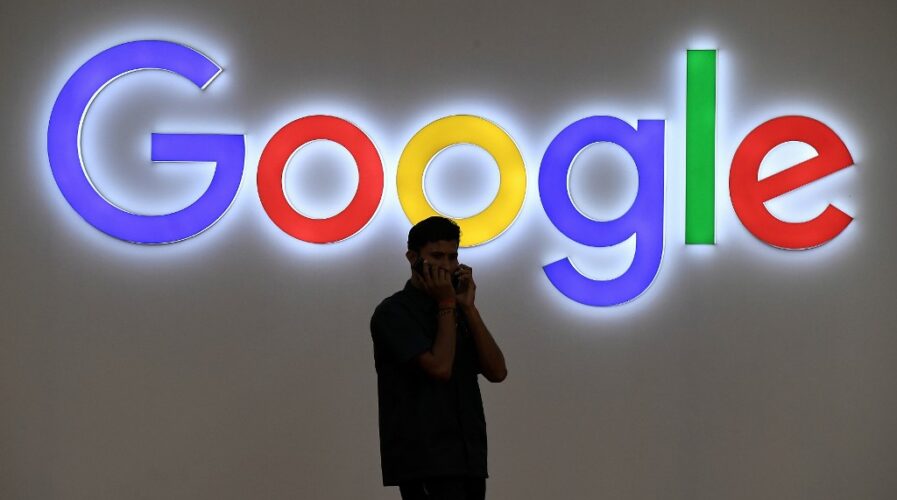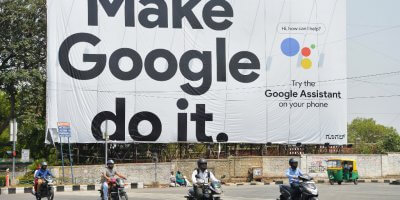
Google fined US$162m in India for “abusing its dominant position”. Source: AFP
Google fined US$162m in India for “abusing its dominant position”
- The competition regulator in India ordered Alphabet Inc’s Google to change its approach to its Android platform after getting fined US$161.95 million for anti-competitive practices
- The competition watchdog is separately also looking into Google’s business conduct in the smart TV market and its in-app payments system
In India, an Android-related probe has been ongoing since 2019, sparked by a complaint from two junior Indian antitrust research associates and a law school student against Google. Similar to the one faced by the search engine giant in Europe, regulators in India are imposing a fine on Alphabet Inc for forcing manufacturers to pre-install its apps on Android devices.
According to Counterpoint Research, Google’s Android operating system powers an overwhelming 97% of India’s 600 million smartphones. Considering its dominance, the Competition Commission of India’s (CCI) investigations unit this week ordered Google to alter its approach to its Android platform, and fined the US tech company Rs13.38 billion (US$161.95 million) for anti-competitive practices.
CCI imposes monetary penalty of ₹ 1337.76 crore on Google for abusing dominant position in multiple markets in the Android Mobile device ecosystem.
Press Release: https://t.co/sXXA0RvK51#Antitrust #AntitrustOrder #antitrustlaw #Google #CCI pic.twitter.com/FE5Yh8PWr4— CCI (@CCI_India) October 20, 2022
In essence, the CCI asserts Google leveraged its market-leading positions in areas such as online search and the Google Play store for Android, to protect the position of its apps like Chrome and YouTube in mobile Web browsers and online video hosting. “Markets should be allowed to compete on merits and the onus is on the dominant players (in the present case, Google) that its conduct does not impinge this competition on merits,” CCI said in a statement.
Therefore, CCI is restricting Google from certain revenue sharing agreements with smartphone makers, noting that such practices helped Google to secure exclusivity for its search services “to the total exclusion of competitors.” For instance, it said that Google should not deny access to its Play Services plugins to “disadvantaged” original equipment manufacturers (OEMs), and the licensing of Play Store to OEMs should not be linked to the requirement of pre-installing Google search, Chrome browser, YouTube, Google Maps, Gmail or any other Google application.
The search and online advertising titan is facing a series of antitrust cases and the tightening of existing tech sector regulations in India. The CCI is even separately looking into Google’s business conduct in the smart TV market and its in-app payments system. For now, the CCI has given Google 30 days to provide the requisite financial details and supporting documents – and the final penalty may increase.
In response, Google had argued about the competitive constraints being faced from Apple Inc in India. The CCI said the differences in the two business models that affect the underlying incentives of business decisions are that Apple’s business is primarily based on a vertically integrated smart device ecosystem, which focuses on the sale of high-end smart devices with advanced software and security.
“Whereas Google’s business was found to be driven by the ultimate intent of increasing users on its platforms so that they interact with its revenue earning service i.e., online search which directly affects sale of online advertising services by Google,” the CCI added. Before this week’s probe, another thorough investigation into Google’s alleged use of unfair revenue-sharing terms with regard to news content were mandated by the CCI earlier this month.
READ MORE
- Ethical AI: The renewed importance of safeguarding data and customer privacy in Generative AI applications
- How Japan balances AI-driven opportunities with cybersecurity needs
- Deploying SASE: Benchmarking your approach
- Insurance everywhere all at once: the digital transformation of the APAC insurance industry
- Google parent Alphabet eyes HubSpot: A potential acquisition shaping the future of CRM


